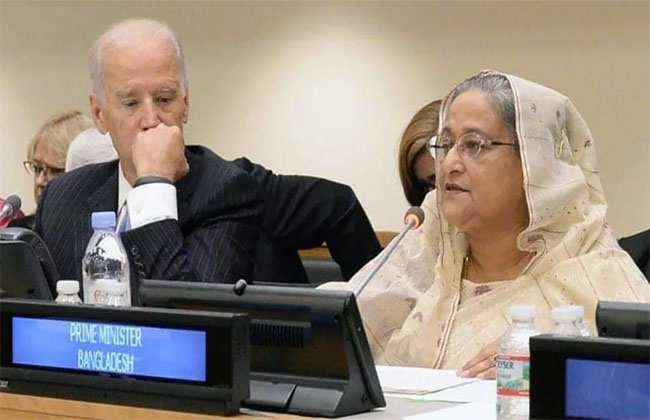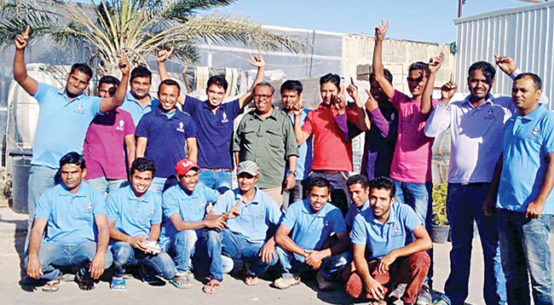
The United States recently released a report on the human rights situation on 198 countries in 2022. The country’s state department made various allegations of human rights violations against Bangladesh.
Bangladesh is experiencing a number of difficulties as a result of global price inflation brought on by the Coronavirus and Ukraine-Russia confrontation. US report was crucial in this circumstance. The US has recently given this part of Asia more attention.
The year 2021 was a trying one for relations between the US and Bangladesh. On December 10, 2021, the US sanctioned Bangladesh’s Rapid Action Battalion (RAB) and numerous current and former officers for a long history of human rights violations, including extrajudicial killings. Bangladesh was not invited to the virtual Summit for Democracy that month by the Biden administration. In 2022, extrajudicial killings, disappearances, suppression of expression and media, use of force in gatherings, obstruction of national and international human rights institutions, etc. continued as usual in Bangladesh. However, compared to 2021, extrajudicial killings have decreased in 2022, according to the report published on the global human rights situation.
These things were said in the report entitled ‘2022 Country Reports on Human Rights Practices’ published on the website of the US State Department on Monday (March 21) about the global human rights situation.
Since US recognition of Bangladesh’s independence in 1972, the trajectory of the relationship has witnessed a consistent upward trend. In 2022, both countries celebrated the auspicious event of 50 years bilateral relations.
Bangladeshi citizens needn’t spark any new controversy and worry based on this recent human rights report. US-Bangladesh bilateral relations wouldn’t affect. This is not the first time the US has produced a study like this in recent years. There isn’t much of a difference between those and the latest report. Many hoped that the Biden administration was going to impose more sanctions on Bangladesh government. But US hasn’t imposed new sanctions on Bangladesh. Bangladesh has recently had the US-Bangladesh Partnership dialogue, Donald Lu, Victoria Nuland’s recent Bangladesh visits, the praiseworthy comments of the President Joe Biden regarding US willingness to engage with the current Bangladesh regime.
Increasing cooperation among the countries can be easily identified through several dialogues and joint training programs that have taken place in the last two years. Bangladesh and the US held the Partnership Dialogue and Security Dialogue in 2022 after a pause due to the pandemic. The dialogues are annual arrangements between the countries and have taken place every year since 2012. The US Navy also attended Bangladesh’s International Fleet Review in December 2022.
Joe Biden’s comment is very important in this regard. It is clear that Joe Biden has keen interest in engaging,cooperating with the Hasina regime in Bangladesh. US President Joe Biden said Bangladesh Prime Minister Sheikh Hasina has set an example of compassion and generosity for the world. In his letter to Sheikh Hasina wishing the great Independence Day, he wished for the progress and development of Bangladesh. In the letter, the US President said, Bangladesh has opened its borders and welcomed nearly 1 million Rohingya refugees.
Stating that Bangladesh has set a shining example of generosity by sheltering Rohingya refugees, Biden said that the United States will stand by as a steadfast partner to find a sustainable solution to the crisis.
In the letter, Biden wrote, Bangladeshis deeply understand the value of freedom and independence, as they fought bravely in 1971 to speak their own language.
The US president wants to remind both nations that “democracy, equality, respect for human rights and free and fair elections” hold “deep value”.
He praised Bangladesh’s demonstrated commitment to protecting the most vulnerable as the largest contributor to peacekeeping operations.
We thank Bangladesh for co-hosting the Global Action Plan at the ministerial level, which significantly increased political commitment to end the global pandemic, Biden said.
Biden also said that the United States and Bangladesh have achieved a lot together in more than 50 years of diplomatic relations. Such as advancing economic development, strengthening people-to-people ties, addressing global health and climate issues, engaging Rohingya refugees in humanitarian response, and building a prosperous, secure, democratic and independent Bangladesh.
On the other hand, when asked why he was in Dhaka, Donald Lu stated, “I am here to enhance the friendship between the two countries at a time when the world is battling for peace and justice.” Donald Lu responded to a question about if the US restriction on RAB was being lifted by saying, “We had a really excellent talk on RAB.”
Anyone can see that the extraordinary improvement RAB has made in lowering the number of extrajudicial murders has been noted in this week’s Human Rights Watch statement. This work is extraordinary. This demonstrates that RAB is effectively defending human rights while upholding law and order and suppressing terrorists.
However, on April 4, 1972, the US formally acknowledged Bangladesh’s newfound independence. The two nations’ relations have since improved in a number of areas. The US is currently one of Bangladesh’s development partners. The link between Dhaka and Washington is reportedly stronger and more extensive than it has ever been.
Bangladesh and the US have shared historical experiences. Both nations share a strong belief in democracy and have endured bloody wars to gain their independence. The democratic process is ongoing. The two countries’ diplomatic ties began on April 4, 1972, when the United States recognized the newly formed Bangladesh. Both countries have had cordial relations for the past 50 years, strengthening collaboration in areas such as development, climate change, counter-terrorism, democracy and human rights.
Over the last decade, cooperation in trade, investment and security, particularly in counter-terrorism, has strengthened. Bangladeshi items have a large market in the US. The trade balance between the two countries favours Bangladesh. The US is the largest single market for garments produced in Bangladesh.
On the economy, Bangladesh and the US share complex interdependence. Bilateral trade is growing fast, reaching US$13 billion in 2022. In 2021, it was $10.5 billion, and in 2020 it was $7.8 billion. Bangladesh also has a surplus of $7.78 billion. Such burgeoning trade has also made the US the third-largest trading partner for Bangladesh behind China and India. By 2019, bilateral commerce had reached $9 billion, with US exports to Bangladesh totaling $2.3 billion, up 12 percent from 2018. Bangladesh exported $6.7 billion to the US, up 9.5 percent from 2018. Bangladesh is the third-largest recipient of US aid in South Asia. The US has praised Dhaka for providing sanctuary to Rohingya refugees.
The relationship between the US and Bangladesh is multifaceted and includes strategic considerations in addition to bilateral ties. Bangladesh has good friendship with the US and the world superpower has a dependable ally in Bangladesh.
The current administration’s foreign policy is, “friendliness with everyone, hostility with none.” Lu’s visit will hopefully deepen the bond between the two nations and contribute significantly to their overall growth.
The government provided a counterargument by criticizing the previous US elections and reiterating its assurance that the upcoming parliamentary elections will be conducted fairly, despite the US representative’s calls for democracy, human rights, and the participation of all parties in the elections.
Bangladesh should pursue its policies and maintain its soft demands in order to enhance its understanding of America and become a trustworthy ally of the US. The US is Bangladesh’s single largest export market for ready-made garments, accounting for 83 percent of total exports. The US was also Bangladesh’s top source of Foreign Direct Investment (FDI) ($3.5 billion in total investments as of 2019). Bangladesh should retain strong connections with the US for two reasons: 1) investment and 2) the Rohingya Crisis. According to recent data, there are 213,372 Bangladeshis living in the US, contributing to the country’s economy.
Last, but not least, through numerous scholarship and study programme, the US has made important contributions to Bangladesh’s knowledge space.
Both countries have been showing signs of progress for some time, with Bangladesh establishing human rights cells and sending out human rights reports. At the same time, the US has reaffirmed its commitment to working with Bangladesh to improve the country’s human rights situation.
Bangladesh supports the US’ Indo-Pacific strategy of freedom and openness. It requires the US for its development. Bangladesh aspires to be a South Asian economic miracle. As a result, it is dependent on the US and the European Union to maintain the current rate of rapid economic growth. Bangladesh is not a threat to the US; it may become one of the trusted allies of the US in the region.
Leaders in Bangladesh are keen to focus on US investment and bilateral trade. The suspended Generalised Scheme of Preferences (GSP) is also on Bangladesh’s agenda. The GSP is an arrangement under which Bangladesh enjoys duty-free access to the US market. This arrangement ceased in 2013, though leaders in Dhaka are hopeful that it might begin again for them.
Future Prospects
As Bangladesh is a tiger economy with a good investment environment, there are strong prospects that bilateral trade and investment will increase in coming years. Bangladesh has identified information communications technology as its “thrust” sector and wants US investment to help it evolve. This will no doubt diversify US investment in Bangladesh. Moreover, Bangladesh has accepted the draft of GSOMIA, meaning potential new sources for defense procurement from the US, benefitting Bangladesh’s Forces Goal-2030.
In summation, the individual sanctions have been limited, suggesting that recent disputes are short-term and not impactful. Beyond the disputes, both countries have mutual interests that are likely to increase in political and economic alignment. Diplomatic engagement and the deepening of relations can be helpful in this context. The reciprocal diplomatic visits over the last two years have been fruitful and have helped to transform the relationship. This should continue.
John Rozario is based in Karnataka, India, and has completed a master’s degree from Jawaharlal Nehru University in International Relations. He is a researcher, Bangladesh studies, strategic and international affairs analyst He can be reached at johnrojariojnu@gmail.com.


